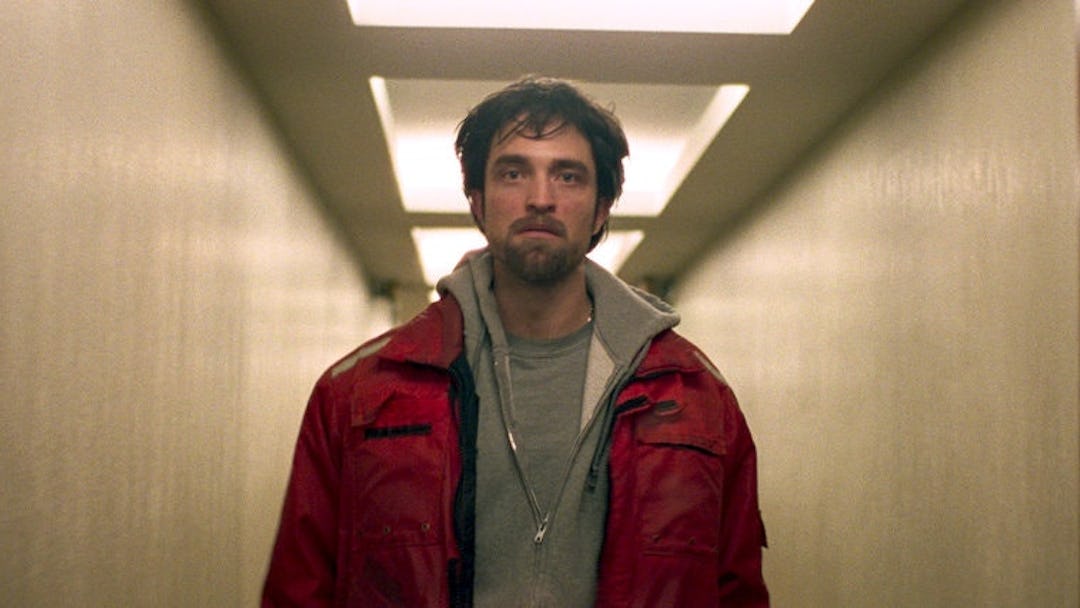Josh and Bennie Safdie’s Good Time opens with a camera crawling through the sky as dread-filled synthesizer music fills the soundtrack, and the movie never really lets up after that. It’s a rattling experience, a one-long-night-in-New-York movie that’s set in the present but filtered through the scuzzy gaze of the city’s past. I kind of loved it.
It’s a strange beast, this movie. What the Safdies manage to do, in a way that’s difficult to puzzle out in retrospect, is tell a relentless crime story with a beat and a pulse, yet fill it with all sorts of inexplicable sidebars and momentary breaks. For example, before the scary-funny bank robbery sequence that would open most filmmakers’ interpretation of this story, they choose the entry point of an antagonistic intelligence/comprehension examination, in which the subject follows his bursts of anger with sudden tears. This is Nicky (Benny Safdie, pulling double duty), who is hard of hearing and a mentally challenged, and just as we’re beginning to get a bead on his, his brother Connie (Robert Pattinson) bursts in to hustle him out. “Shame on you, you’re not helping,” the doctor reprimands, but when they’re alone in the elevator, Connie looks him in the eye and assures him, “It’s just you and me. I’m your friend.” And then they go rob a bank.
Their plan is either elegantly simple or staggeringly stupid – same goes for the characters, really – and though they make it out of the bank, the dye pack explodes all over their getaway ride, they end up spotted by the cops, and Nicky runs face-first into a sliding glass door. The cops haul him off to prison, where he makes enemies immediately; he concludes his first night there lying on the floor, his face a bloody pulp.
This all happens by the end of the opening credits, which gives you some idea of the ruthlessness of this thing. And the Safdies keep flipping the script; they lay the groundwork for a whatever-it-takes money hunt, with Connie in dire need of 10 grand to bail his brother out, and Jennifer Jason Leigh showing up as the moneyed older woman who’s slumming it with him, creating an utterly convincing and complete character in maybe three scenes, masterfully combining fragility and combustability. But then the script zigs when you think it’ll zag. Connie discovers his brother’s been transferred to a public hospital and decides to break him out, the pair of them taking advantage of the kindness of a fellow patient, until…
And that’s where we stop, as one of the pleasures of Good Time is its willingness to keep spinning off in strange, unexpected directions. Content truly does inform form here; Connie spends the entire movie in a mode of desperate improvisation, and the film keys off that energy and spirit. “Don’t be confused!” he pleads at one point. “It’s just gonna make it worse for me!” And that’s pretty much the character’s M.O. The Safdies surround their marquee star with unknowns and non-actors, and he tunes in to the authenticity of the supporting players, using their realism as his anchor. To be clear, this is not a remotely sympathetic character – he’s the kind of guy who says something like “You’re 16? You look way older than that” and you know exactly where he’s going – but the picture is so breathlessly at his elbow, you just end up along for the ride.
As with their previous film, the unsettling junkie day-to-day Heaven Knows What, the Safdies adopt a jittery aesthetic that’s pulsing, pounding, and relentless. The sound design is downright assaultive; particularly early on, Pattinson is constantly being yelled at (and yelling back), and the score is nonstop, occasionally even overpowering the dialogue in favor of a general din. It works – the specifics of what’s being said are less important than the fact that the point comes across – but the sheer volume, the intensity of the sound, can make you uneasy. Then, however, there are these oases of quiet: the tiny beat when Pattinson and a stranger share an orange juice, or his kindness in private to the teenage girl whose car he’s stolen, or the picture’s peculiar but affecting epilogue.
The central quest and conflict unravels all at once, in a way that’s somewhat anticlimactic – it seems realistic, to be sure, just not quite dramatically satisfying. And the picture’s unwavering sleaziness and fever pitch will no doubt prove divisive. But the Safdie brothers are onto something here, embracing established narrative tropes, infusing them with experimental and experiential techniques, and juicing up the adrenaline. Say what you will about Good Time, but it is uniquely theirs.
“Good Time” is out Friday in limited release.
